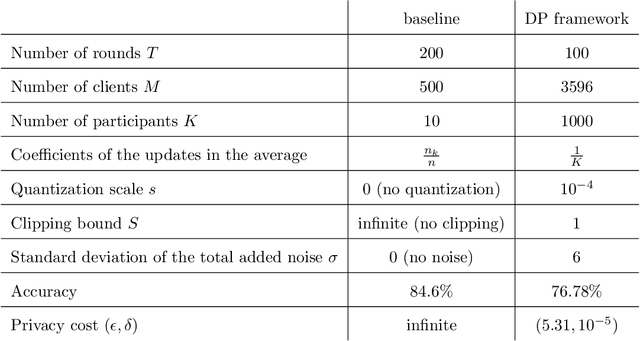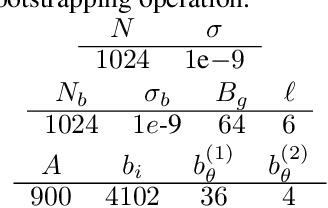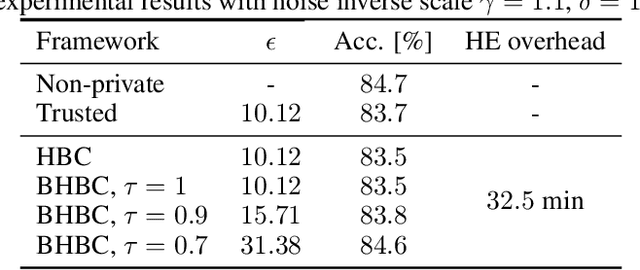Renaud Sirdey
Robust Federated Learning via Byzantine Filtering over Encrypted Updates
Feb 05, 2026Abstract:Federated Learning (FL) aims to train a collaborative model while preserving data privacy. However, the distributed nature of this approach still raises privacy and security issues, such as the exposure of sensitive data due to inference attacks and the influence of Byzantine behaviors on the trained model. In particular, achieving both secure aggregation and Byzantine resilience remains challenging, as existing solutions often address these aspects independently. In this work, we propose to address these challenges through a novel approach that combines homomorphic encryption for privacy-preserving aggregation with property-inference-inspired meta-classifiers for Byzantine filtering. First, following the property-inference attacks blueprint, we train a set of filtering meta-classifiers on labeled shadow updates, reproducing a diverse ensemble of Byzantine misbehaviors in FL, including backdoor, gradient-inversion, label-flipping and shuffling attacks. The outputs of these meta-classifiers are then used to cancel the Byzantine encrypted updates by reweighting. Second, we propose an automated method for selecting the optimal kernel and the dimensionality hyperparameters with respect to homomorphic inference, aggregation constraints and efficiency over the CKKS cryptosystem. Finally, we demonstrate through extensive experiments the effectiveness of our approach against Byzantine participants on the FEMNIST, CIFAR10, GTSRB, and acsincome benchmarks. More precisely, our SVM filtering achieves accuracies between $90$% and $94$% for identifying Byzantine updates at the cost of marginal losses in model utility and encrypted inference runtimes ranging from $6$ to $24$ seconds and from $9$ to $26$ seconds for an overall aggregation.
Practical Homomorphic Aggregation for Byzantine ML
Sep 15, 2023



Abstract:Due to the large-scale availability of data, machine learning (ML) algorithms are being deployed in distributed topologies, where different nodes collaborate to train ML models over their individual data by exchanging model-related information (e.g., gradients) with a central server. However, distributed learning schemes are notably vulnerable to two threats. First, Byzantine nodes can single-handedly corrupt the learning by sending incorrect information to the server, e.g., erroneous gradients. The standard approach to mitigate such behavior is to use a non-linear robust aggregation method at the server. Second, the server can violate the privacy of the nodes. Recent attacks have shown that exchanging (unencrypted) gradients enables a curious server to recover the totality of the nodes' data. The use of homomorphic encryption (HE), a gold standard security primitive, has extensively been studied as a privacy-preserving solution to distributed learning in non-Byzantine scenarios. However, due to HE's large computational demand especially for high-dimensional ML models, there has not yet been any attempt to design purely homomorphic operators for non-linear robust aggregators. In this work, we present SABLE, the first completely homomorphic and Byzantine robust distributed learning algorithm. SABLE essentially relies on a novel plaintext encoding method that enables us to implement the robust aggregator over batching-friendly BGV. Moreover, this encoding scheme also accelerates state-of-the-art homomorphic sorting with larger security margins and smaller ciphertext size. We perform extensive experiments on image classification tasks and show that our algorithm achieves practical execution times while matching the ML performance of its non-private counterpart.
When approximate design for fast homomorphic computation provides differential privacy guarantees
Apr 06, 2023Abstract:While machine learning has become pervasive in as diversified fields as industry, healthcare, social networks, privacy concerns regarding the training data have gained a critical importance. In settings where several parties wish to collaboratively train a common model without jeopardizing their sensitive data, the need for a private training protocol is particularly stringent and implies to protect the data against both the model's end-users and the actors of the training phase. Differential privacy (DP) and cryptographic primitives are complementary popular countermeasures against privacy attacks. Among these cryptographic primitives, fully homomorphic encryption (FHE) offers ciphertext malleability at the cost of time-consuming operations in the homomorphic domain. In this paper, we design SHIELD, a probabilistic approximation algorithm for the argmax operator which is both fast when homomorphically executed and whose inaccuracy is used as a feature to ensure DP guarantees. Even if SHIELD could have other applications, we here focus on one setting and seamlessly integrate it in the SPEED collaborative training framework from "SPEED: Secure, PrivatE, and Efficient Deep learning" (Grivet S\'ebert et al., 2021) to improve its computational efficiency. After thoroughly describing the FHE implementation of our algorithm and its DP analysis, we present experimental results. To the best of our knowledge, it is the first work in which relaxing the accuracy of an homomorphic calculation is constructively usable as a degree of freedom to achieve better FHE performances.
Protecting Data from all Parties: Combining FHE and DP in Federated Learning
May 09, 2022



Abstract:This paper tackles the problem of ensuring training data privacy in a federated learning context. Relying on Fully Homomorphic Encryption (FHE) and Differential Privacy (DP), we propose a secure framework addressing an extended threat model with respect to privacy of the training data. Notably, the proposed framework protects the privacy of the training data from all participants, namely the training data owners and an aggregating server. In details, while homomorphic encryption blinds a semi-honest server at learning stage, differential privacy protects the data from semi-honest clients participating in the training process as well as curious end-users with black-box or white-box access to the trained model. This paper provides with new theoretical and practical results to enable these techniques to be effectively combined. In particular, by means of a novel stochastic quantization operator, we prove differential privacy guarantees in a context where the noise is quantified and bounded due to the use of homomorphic encryption. The paper is concluded by experiments which show the practicality of the entire framework in spite of these interferences in terms of both model quality (impacted by DP) and computational overheads (impacted by FHE).
SPEED: Secure, PrivatE, and Efficient Deep learning
Jun 16, 2020



Abstract:This paper addresses the issue of collaborative deep learning with privacy constraints. Building upon differentially private decentralized semi-supervised learning, we introduce homomorphically encrypted operations to extend the set of threats considered so far. While previous methods relied on the existence of an hypothetical 'trusted' third party, we designed specific aggregation operations in the encrypted domain that allow us to circumvent this assumption. This makes our method practical to real-life scenario where data holders do not trust any third party to process their datasets. Crucially the computational burden of the approach is maintained reasonable, making it suitable to deep learning applications. In order to illustrate the performances of our method, we carried out numerical experiments using image datasets in a classification context.
 Add to Chrome
Add to Chrome Add to Firefox
Add to Firefox Add to Edge
Add to Edge